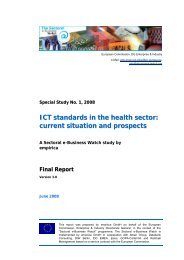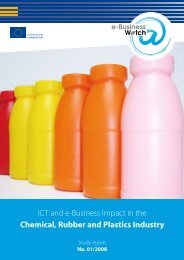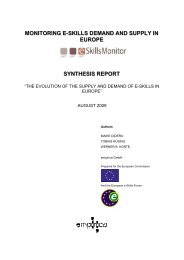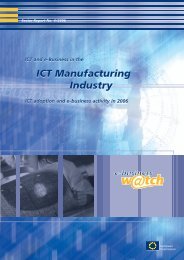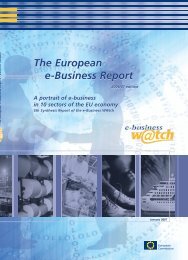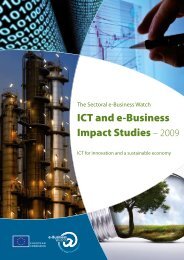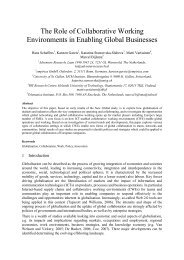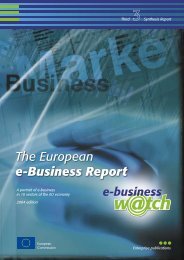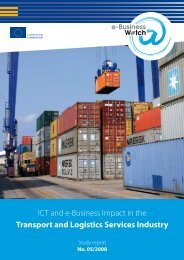The European e-Business Report The European e ... - empirica
The European e-Business Report The European e ... - empirica
The European e-Business Report The European e ... - empirica
You also want an ePaper? Increase the reach of your titles
YUMPU automatically turns print PDFs into web optimized ePapers that Google loves.
<strong>The</strong> <strong>European</strong> E-<strong>Business</strong> <strong>Report</strong> 2005<br />
3.3 e-<strong>Business</strong> in the Netherlands<br />
by Ronald Batenburg, Utrecht University, <strong>The</strong> Netherlands<br />
Introduction<br />
This article presents some of the current trends and initiatives with respect to e-business in the<br />
Netherlands. Without claiming to be complete, we will attempt to provide a balanced picture of both<br />
the market developments and policy-related e-business projects. <strong>The</strong> chapter is divided into three<br />
sections. Firstly, the ICT-sector is described including the role of governmental and policy initiatives to<br />
support and enable ICT research and development in the Netherlands. This description is completed<br />
with a policy initiative example to enhance ICT for the elderly. <strong>The</strong> second section of this chapter<br />
addresses the actual state of and trends in ICT and e-business adoption. <strong>The</strong>se developments are<br />
presented against other <strong>European</strong> countries in order to describe the Dutch situation in international<br />
perspective. <strong>The</strong> article finishes with a summary and concluding remarks.<br />
3.3.1 <strong>The</strong> ICT sector and E-business policy and in <strong>The</strong> Netherlands<br />
We start this section by describing the organisations that develop, build, sell, consult and support the<br />
actual products and services of the Dutch e-business industry, i.e. the ICT companies. <strong>The</strong><br />
Netherlands holds a prominent tradition in mathematics and theoretical computer science, and as of<br />
now there is an active community of programmers, software developers and even hackers. Just before<br />
and after the year 2000 however, the Dutch ICT industry transformed more and more into clusters of<br />
industries dedicated to high-skilled activities as research, product development and consultancy in IT<br />
and ICT.<br />
<strong>The</strong> ICT industry in the Netherlands<br />
With some exceptions, the mainstream of Dutch initiatives in IT and ICT is oriented to embedded<br />
software, product software and related services. A spectacular example of product software<br />
entrepreneurship is the BAAN company, which managed to achieve a significant market share of the<br />
specialised market for Enterprise Resource Planning (ERP). As of now, BAAN and its ERP-software is<br />
part of the larger SSA Global, as it did not recover from a dramatic drop in shareholder support after<br />
financial failures in 2000.<br />
At the same time however, many other Dutch IT-vendors such as Exact, Unit4Agresso, AFAS and<br />
Grote Beer have successfully applied the business model of "product software"; developing standard<br />
software and IT-solutions once and then selling it many times, thereby optimising the principle of the<br />
network or information economy. In embedded software, Philips and ASML are prominent players, as<br />
well as the recent success story of navigation software producer Tom Tom. In addition, several major<br />
international ICT (consultancy) companies have important branches in the Netherlands, for example<br />
Atos Origin (including Sogeti), Accenture, Cap Gemini, CISCO, Deloitte, EDS, IBM, KPMG, Microsoft,<br />
Oracle, SAP, as well as ICT companies like Ordina and Pentascope that are national-oriented.<br />
As of 2003, nearly 24,000 ICT-companies were active in the Netherlands, over 276,000 persons<br />
employed in ICT-related professions and 4.4 million employees are PC-users (Statistics Netherlands,<br />
2005). Up to 2003, the proportion of ICT-companies within the Dutch population of enterprises<br />
increased constantly to 3.5%. In terms of economic value, it is estimated that 20% of the economic<br />
growth between 1996 and 2000 was accounted for by the ICT-sector, in particular because of high<br />
annual investments. <strong>The</strong> value added of the ICT-sector to the Dutch General Domestic Product (GPD)<br />
is about 1% and decreases after the year 2001. As is internationally the case, the Dutch ICT-sector<br />
significantly changed from a rapidly growing mode to a state of consolidation and, in some cases,<br />
reduction.<br />
179



